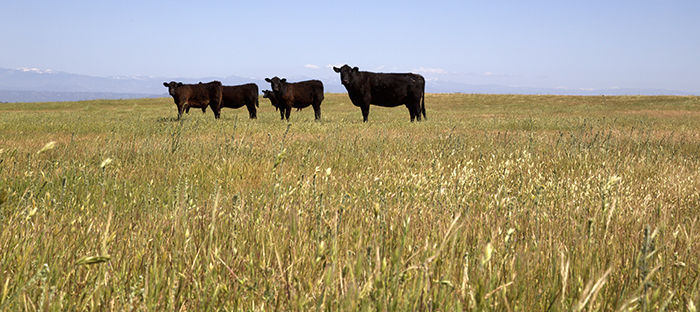
Cows in a field
Credit: NRCS
May 5, 2021 - DAVIS, Calif. - USDA’s Natural Resources Conservation Service (NRCS) in California proudly adds the biodiverse 3,602-acre McKinney Ranch in Madera County to its roster of conservation easements, bringing the 28-year state total to 211,856 acres. California’s easement acreage nests within the national total of 5 million acres—a milestone announced in early April by the Agency.
The Sierra Foothill Conservancy partnered with NRCS, the California Department of Conservation and the Bureau of Reclamation to acquire the voluntary easement on the Madera ranch, owned by Scott and Cherisse McKinney.
“We celebrate all our conservation easements, and the dedicated partners and landowners who make them possible,” says Carlos Suarez, state conservationist. “But this easement on the McKinney family’s cow-calf operation is really special. It is a unique rural landscape with a rich agricultural heritage as well as abundant ecological benefits such as vernal pool wetlands, miles of winding creeks and hundreds of common and imperiled plant and wildlife species,” said Suarez.
“Sierra Foothill Conservancy enjoys partnering with NRCS at both the local and state level and we cannot say enough about the importance of the ACEP-ALE program for conserving both working lands and critical habitats,” said Lauren Miller, SFC Conservation Director. “We are proud to welcome the McKinney’s into our family of conservation easement landowners and eternally grateful for their decision to conserve this working ranch, which brought SFC to over 50,000 acres of conserved land on our 25th anniversary.”
NRCS Biologist Jesse Bahm calls the biodiversity of the property, “just stunning.” Bahm says a partial list of the wildlife species found on the ranch includes tricolored blackbird, western burrowing owl, California tiger salamander, western spadefoot toad, vernal pool and mid-valley fairy shrimp, American badger, Swainson’s hawk, and foraging bald and golden eagle. Bahm adds that unique plants are also found on the ranch, which is in the southern portion of the federally designated Madera Vernal Pool Recovery Area—20,000 contiguous acres of vernal pool habitat.
Today, conservation easements like the McKinney Ranch are being recognized and valued not only for helping to protect America’s food supply but also for their contributions to climate change mitigation by preventing land conversion and increasing carbon storage through well-managed grazing, says Suarez.
The McKinney ranch is the most recent property protected in California through NRCS’ Agricultural Conservation Easement Program – Agricultural Land Easements (ACEP-ALE). California NRCS currently holds 129 such easements totaling 56,189 acres.
In addition to ACEP-ALE, NRCS also offers the Agricultural Conservation Easement Program - Wetland Reserve Easements (ACEP-WRE), providing protection to 301 wetland easements in California totaling 131,436 acres. Both programs are offered through the Farm Bill’s Agricultural Conservation Easement Program (ACEP). ACEP continues a 28-year history of working with landowners, land trusts, and other entities to voluntarily protect, restore, and enhance wetlands, grasslands, and working farms and ranches.
Source: NRCS








